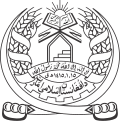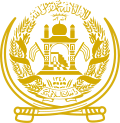List of governors of Badakhshan
 From Wikipedia - Reading time: 12 min
From Wikipedia - Reading time: 12 min
The Governor of Badakhshan (Persian: حاکم بدخشان, hākim-i badakhshān, Pashto: د بدخشان والي) is the head of the government of Badakhshan. In the late 19th century Badakhshan was joined with Qataghan into a single province and there were governors of Qataghan-Badakhshan Province and Badakhshan District. In 1963 the province was dissolved and Badakhshan became one of the 34 provinces of Afghanistan. Badakhshan province is located in the north-east of the country, between the Hindu Kush and the Amu Darya. The capital of Badakhshan and the seat of the provincial governor is the town of Fayzabad.
Traditionally, Badakhshan was ruled by a mir. In 1859 Badakhshan came under control of the Amir of Afghanistan. The mirs continued to wield power, but the Amir of Afghanistan appointed a hakim (حاکم), or governor, to rule the province. The title of Hakim was applied to numerous administrative positions in Afghanistan and several positions with different administrative responsibilities could all be called hakim. An example of this is in 1873, when administrative of Badakhshan was placed under the rule of the Hakim of Afghan Turkestan, who in turn appointed a Hakim of Badakhshan. Thus, at times the Hakim of Badakhshan has been subservient to the hakim of another region. In 1873 the Mir of Afghanistan also became a pensioner of the Kabul and ceased to hold power in Badakhshan.[1]
In the late 19th century Badakhshan was joined with Qataghan Province into a single province named Qataghan-Badakhshan Province that had a single governor. The capital of Qataghan-Badakhshan Province and seat of the provincial governor was the town of Khan Abad, currently located in Kunduz province.[2] Qataghan and Badakhshan were again divided in 1963 and the capital of Badakhshan reverted to Fayzabad. Some sources indicate that there may have been more than one governor appointed at a time.[3]
List
[edit]| No. | Portrait | Name | Term of office | Political party | Extra | Note | ||
|---|---|---|---|---|---|---|---|---|
| Took office | Left office | |||||||
| Governors of Qataghan-Badakhshan Province | ||||||||
| 1 |  |
Sardar Abdur Rahman Khan | 1863 | 1864 | Independent (monarchy) | Abdur Rahman Khan, the future king of Afghanistan, is mentioned as the "Governor of Qataghan and Badakhshan" in Siraj al-Tawarikh, which was commissioned during his reign as Amir of Afghanistan. Holding the position of a sardar, or general, Abdur Rahman Khan ruled over Qataghan and Badakhshan while he waged a military campaign in the region.[4][5] | ||
| 2 |  |
Faiz Muhammad Khan[6] | 1865 | ? | Independent (monarchy) | |||
| 3 |  |
Hafizullah Khan | 1873 | 1874 | Independent (monarchy) | From 1873 to 1874 Badakhshan was directly administered by the governor of Afghan Turkestan, Naib Muhammad Alam Khan. Alam Khan appointed Hafizullah Khan as governor of Badakhshan.[1] | ||
| 4 |  |
Faiz Muhammad | May 1874 | September 1874 | Independent (monarchy) | In May 1874 Faiz Muhammad was appointed to relieve Hafizullah Khan as Governor of Badakhshan, but he was relieved of his appointment in September 1874.[7] | ||
| 5 |  |
Sayyid Muhammad Khan | September 1874 | ? | Independent (monarchy) | In September 1874 Colonel Sayyid Muhammad Khan was appointed to relieve Faiz Muhammad as Governor of Badakhshan.[7] | ||
| 6 |  |
Mir Mahomed Omar | 1880 | ? | Independent (monarchy) | Abdur Rahman Khan mentions in his memoirs that Mir Mahomed Omar "Governor of Faizabad," which was then the capital of Badakhshan.[8] | ||
| 7 |  |
Sardar Abdulla Khan | 1881/1882 | September 1888 | Independent (monarchy) | The Siraj al-tawarıkh notes that in 1882 Sardar Abd Allah Khan Tukhi was the governor of Badakhshan and Qataghan.[9] British archival documents from 1884 to 1885 mention a Sardar Abdulla Khan as governor of Badakhshan[10] Lee mentions Sardar Abdulla Khan as governor of Badakhshan and Qataghan in 1888 during the rebellion of Ishaq Khan.[11] Sardar Abdullah Khan was decisively defeated by Ishaq Khan in September 1888 and fled the battlefield.[12] | ||
| 8 |  |
Walidad Muhammad | 1880s? | ? | Independent (monarchy) | Wali Muhammad served as Governor of the District of Badakhshan in the 1880s. He is a native of Qalat-i-Ghilzai[13] | ||
| 9 |  |
Mir Ahmad Shah | 1887 | 1887 | Independent (monarchy) | At the beginning of 1887 Mir Ahmad Shah was appointed Governor of Badakhshan, but before he left Kabul to take up his appointment in Badakhshan he was demoted and Abdullah Jan took his place[14] | ||
| 10 |  |
Abdullah Jan | 1887 | ? | Independent (monarchy) | In 1887 Abdullah Jan was appointed governor of Badakhshan.[14] | ||
| 11 |  |
Abdul Ahad Wardak | 1910s | ? | Independent (monarchy) | Wardak was the governor of Qataghan-Badakhshan Province. | ||
| 12 |  |
Azimullah Khan | 1928 | 1928 | Independent (monarchy) | Served as Governor of Qataghan-Badakhshan Province in 1928.[15] | ||
| 13 |  |
Muhammad Sarwar | 1928 | 1928 | Independent (monarchy) | In 1928 Muhammad Sarwar was appointed Governor of Badakhshan and Qataghan, but he never took up the appointment.[16] | ||
| 14 |  |
Safarhan (also known as Nasir Safar)[17] | November 1929 | ? | Independent (monarchy) | Safarhan was appointed governor of Qataghan-Badakhshan Province following the fall of the government of Habibullāh Kalakāni. He remained in office at least through mid-1930.[17] | ||
| 15 |  |
Shir Muhammad Nasher | 1932 | ? | Independent (monarchy) | Shir Muhammad Nasher served as Governor of Badakhshan and Qataghan from 1932 onwards [13] | ||
| 16 |  |
Shar Mohammed Khan | ? (First documented in 1937) | ? | Independent (monarchy) | American Ernest F. Fox reported meeting Shar Mohammed Khan, the Governor of Qataghan and Badakhshan, during his travels through Afghanistan in 1937.[18] | ||
| 17 |  |
Said Abbas Khan | ? (First documented in 1937) | ? | Independent (monarchy) | American Ernest F. Fox reported meeting Said Abbas Khan, the Governor of Badakhshan district, during his travels through Afghanistan in 1937.[18] | ||
| 18. |  |
Muhammad Ismail Mayar | 1938 | ? | Independent (monarchy) | Muhammad Ismail Mayar replaced Shir Muhammad Nasher as Governor of Badakhshan and Qataghan in 1938[13] | ||
| 19 |  |
Ghulam Faruq | 1939 | ? | Independent (monarchy) | Ghulam Faruq replaced Muhammad Ismail Mayar as Governor of Badakhshan and Qataghan in 1939[13] | ||
| 20 |  |
Muhammad Gul | 1940 | ? | Independent (monarchy) | General Muhammad Gul replaced Ghulam Faruq as Governor of Badakhshan and Qataghan in 1940[13] | ||
| 21 |  |
Ghulam Faruq | 1942 | ? | Independent (monarchy) | Ghulam Faruq, who served as governor from 1939 until his replacement by Muhammad Gul, was again appointed Governor of Badakhshan and Qataghan in place of Muhammad Gul in 1942[13] | ||
| 22 |  |
Muhammad Juma Siddiq | 1945 | ? | Independent (monarchy) | Muhammad Juma Siddiq was appointed governor of the District of Badakhshan in 1945[13] | ||
| 23 |  |
Muhammad Hakim Shah Alami | 1946 | ? | Independent (monarchy) | Muhammad Hakim Shah Alami replaced Ghulam Faruq as Governor of Badakhshan and Qataghan in 1946[13] | ||
| 24 |  |
Muhammad Karim | 1946 | ? | Independent (monarchy) | Muhammad Karim replaced Muhammad Juma Siddiq as governor of the District of Badakhshan in 1946[13] | ||
| 25 |  |
Muhammad Sawar Khan | 1948 | ? | Independent (monarchy) | Muhammad Sawar Khan replaced Muhammad Karim as governor of the District of Badakhshan in 1948[13] Jean Bowie Shor and Franc Shor reported meeting Khan in Faizabad in the summer of 1949 during their travels through Afghanistan.[19] | ||
| 26 |  |
Muhammad Ismail Mayar | 1950 | 1954 | Independent (monarchy) | Muhammad Ismail Mayar, who served as governor until his replacement by Ghulam Faruq, replaced Muhammad Hakim Shah Alami as Governor of Badakhshan and Qataghan in 1950[13] | ||
| 27 |  |
Muhammad Juma Siddiq | 1954 | 1956 | Independent (monarchy) | Muhammad Juma Siddiq, who had previously served as Governor of the District of Badakhshan, replaced Muhammad Karim as governor of the District of Badakhshan in 1954[13] | ||
| 28 |  |
Muhammad Juma Siddiq | 1956 | 1956 | Independent (monarchy) | Muhammad Juma Siddiq was promoted from Governor of the District of Badakhshan to replace Muhammad Ismail Mayar as Governor of Badakhshan and Qataghan in 1956[13] | ||
| 29 |  |
Abdur Rahman Popal | 1956 | 1959 | Independent (monarchy) | Abdur Rahman Popal replaced Muhammad Juma Siddiq as governor of the District of Badakhshan in 1956[13] | ||
| 30 |  |
Khuda Dad Etemadi | 1959 | 1960 | Independent (monarchy) | Khuda Dad Etemadi replaced Abdur Rahman Popal as governor of the District of Badakhshan in 1959[13] | ||
| 31 |  |
Din Muhammad Delawar | 1960 | 1962 | Independent (monarchy) | Din Muhammad Delawar replaced Khuda Dad Etemadi as governor of the District of Badakhshan in 1960[13] | ||
| Governors of Badakhshan Province | ||||||||
| 32 |  |
Abdul Qayyum Atai | 1962 | ? | Independent (monarchy) | Abdul Qayyum Atai replaced Din Muhammad Delawar as governor of the District of Badakhshan in 1962[13] | ||
| 33 |  |
Abdul Karim Seraj | 1963 | 1963 | Independent (monarchy) | General Abdul Karim Seraj (alternatively spelled Siraj) replaced Muhammad Ismail Mayar as Governor of Badakhshan and Qataghan in 1963. He was the last Governor of Badakhshan and Qataghan, which was dissolved and divided into four provinces in 1963.[13] He then served as governor Kunduz from 1963 to 1965 following the division of Qattaghan and Badakhshan Province.[citation needed] | Seraj was the son of Habibullah Khan, Amir of Afghanistan from 1901 to 1919. He was born in 1912. | |
| 34 |  |
Nisar Ahmad Sherzai | 1963 | 1967 | Independent (monarchy) | Nisar Ahmad Sherzai was appointed governor of the newly created Badakhshan Province in 1963[13] | ||
| 35 |  |
Roshandil Roshan | 1967 | ? | Independent (monarchy) | Roshandil Roshan replaced Nisar Ahmad Sherzai as Governor of Badakhshan Province in 1967[13] | ||
| 36 |  |
Sultan Aziz Zikria | 1970[20] | 1970 | Independent (monarchy) | |||
| 37 |  |
Roshandel Wardak (also spelled Roshandil Wardak) [21][22] | 1960s | 1970s | Independent (monarchy) | |||
| 38 |  |
Sayyid Kasim | 1971-? | ? | Independent (monarchy) | Sayyid Kasim was appointed Governor of Badakhshan Province in 1971[13] | ||
| 39 |  |
Taj Mohammad Wardak | 1970s | 1970s | Independent (monarchy) | In addition, in the mid-1960s Wardak held the position of Deputy Governor of Badakhshan Province.[23] | ||
| 40 |  |
Abdul Basir Salangi | 1970s[3] | 1970s | Independent (monarchy) | |||
| 41 |  |
Habibullah Korur | 1970s[3] | May 1979 | Independent | |||
| 42 |  |
Muhammad Usman Rasikh | 1970s[3] | 1970s | Independent (monarchy) | |||
| 43 |  |
Abdul Aziz Azim[24] | 1960s[3] | July 1979 | Independent | |||
| 44 |  |
Ghulam Mohammed Arianpur | ? | 1993 (died in office) | ? | Ghulam Mohammed Arianpur died in a chopper crash in 1993.[25] | ||
| 45 |  |
Mawlawi Qiamoddin Khiradmand | ? | 1999 † (Killed in Action) | Taliban | He was killed by the fighters of Ahmad Shah Masood's Shura-e Nezar in 1999.[26][27] | ||
| 46 |  |
Qazi Mohammad Sarwar/ Jamullah | 1997 | 2001 | ? | Qazi Mohammad Sarwar as known Jamullah Was Deputy of Khiradmand, after Khiradmand died, He appointed as a Governor of Badakhshan Province up to 2001. | ||
| 47 |  |
Mohammad Amaan Hamimi | ? | ? | ? | |||
| 48 |  |
Sayed Ikramuddin Masoomi | March 2004 |
? | ? | Former Governor of Takhar. Became minister of Work and Social Affairs after his time as Governor of Badakshan. | ||
| 49 |  |
Sayyed Mohammad Akram | 21 February 2005 |
? | ? | |||
| 50 |  |
Abdul Munshi Majid | 7 April 2006 | 2009 | Hezb-e Islami Gulbuddin | Was replaced after demonstrations which accused Majid of involvement in misusing power.[28] | ||
| 51 |  |
Baz Mohammad Ahmadi | 2 May 2009 | 2 November 2010 | Jamiat-e-Islami | Was former Governor of Ghor. | ||
| 52 |  |
Shah Waliullah Adeeb | 2 November 2010 | 25 October 2015 | Jamiat-e-Islami | Member of the Jamiat-e-IslamiParty, formerly a professor at Kabul University and spokesman for Ministry of Education. Survived attack on 20 June 2011 in Ordoj District.[29] | ||
| 53 |  |
Ahmad Faisal Begzad[30] | 26 October 2015 | ? | ? | |||
| 54 |  |
Mohammad Zakaria Sawda[31] | ? |
? | ? | |||
| 55. |  |
Maulvi Amanuddin Mansoor[32] | September 2021 | 7 November 2021 | Taliban | |||
| 56 | Maulvi Abdul Ghani Faiq[33] | 7 November 2021 | 25 June 2023 | Taliban | ||||
| 57 |  |
Qari Mohammad Ayub Khalid | 25 June 2023 | present | Taliban | Was former Governor of Kunar | ||
See also
[edit]References
[edit]- ^ a b Christine Noelle. State and tribe in nineteenth-century Afghanistan: the reign of Amir Dost Muhammad Khan (1826-1863). Richmond: Routledge, 1997. pp. 101, 320
- ^ Ludwig W. Adamec. Historical and political gazetteer of Afghanistan Vol. 1. Badakhshan Province and northeastern Afghanistan. Graz : Akad. Druck- und Verl.-Anst., 1972.p. 98.
- ^ a b c d e Ludwig W. Adamec. First Supplement to the Who's Who of Afghanistan: Democratic Republic of Afghanistan. Graz: Akademische Druck - u. Verlagsanstalt, 1979. p. 48.
- ^ Faiz Mohammad Katib Hazara and R. D. McChesney (translator). Siraj al-Tawarikh, Vol. 2. Publisher. Afghanistan Digital Library. page 105. (no longer available online).
- ^ Mohammad, Faiz. Siraj al-Tawarikh, Vol. 2. p. 262. Retrieved 2011-10-15.
- ^ Imperial gazetteer of India: provincial series, Volume 1. Calcutta: Superintendent of Government Printing, 1908
- ^ a b Adamec, Ludwig W. (1975). Historical and Political Who's Who of Afghanistan. Graz: Akad. Druck- und Verl.-Anst. p. 135.
- ^ ʻAbd al-Raḥmān Khān (1900). The life of Abdur Rahman, amir of Afghanistan, Volume 1. London: John Murray. p. 189.
- ^ Faiz Mohammad Katib Hazara and R.D. McChesney (translator). Siraj al-Tawarikh, Vol. 3. Publisher. Afghanistan Digital Library. pages 31, 34, 215, 228. (no longer available online).
- ^ Kandahar Newsletters For The Year 1884-85. Volume-Ii. Quetta: Directorate Of Archives Department. Government of Balochistan, Quetta (Pakistan), 1990. p. 190
- ^ Jonathan L. Lee. The "ancient Supremacy": Bukhara, Afghanistan, and the Battle for Balkh, 1731-1901. New York: E.J. Brill, 1996. p. 507.
- ^ Jonathan L. Lee. The "ancient Supremacy": Bukhara, Afghanistan, and the Battle for Balkh, 1731-1901. New York: E.J. Brill, 1996. p. 511.
- ^ a b c d e f g h i j k l m n o p q r s t u Adamec, Ludwig W. (1975). Historical and Political Who's Who of Afghanistan. Graz: Akad. Druck- und Verl.-Anst. p. 345.
- ^ a b Adamec, Ludwig W. (1975). Historical and Political Who's Who of Afghanistan. Graz: Akad. Druck- und Verl.-Anst. p. 189.
- ^ Adamec, Ludwig W. (1975). Historical and Political Who's Who of Afghanistan. Graz: Akad. Druck- und Verl.-Anst. p. 129.
- ^ Adamec, Ludwig W. (1975). Historical and Political Who's Who of Afghanistan. Graz: Akad. Druck- und Verl.-Anst. p. 200.
- ^ a b Abdullaev, Kamoludin Nazhmudinovich (2009). Ot Sin'tsziania do Khorasana : iz istorii sredneaziatskoi emigratsii XX veka. Dushanbe: Irfon. ISBN 978-99947-55-55-4.
- ^ a b Ernest F. Fox. Travels in Afghanistan 1937-1938. New York: The Macmillan Company, 1943. p. 43
- ^ Jean and Franc Shor. "We took the highroad in Afghanistan." National Geographic. November, 1950. Vol. 98, no. 5. pp. 673-706.
- ^ Ludwig W. Adamec. Historical and political gazetteer of Afghanistan Vol. 1. Badakhshan Province and northeastern Afghanistan. Graz : Akad. Druck- und Verl.-Anst., 1972.p. 27.
- ^ Home Brief. Kabul Times. vol. vi. no. 159. October 9, 1967.
- ^ "Royal audience." Kabul Times. vol. ix. no. 17. April 2, 1970
- ^ Royal Audience. Kabul Times. vol. iv. no. 71. June 19, 1965
- ^ "Saur seven victory celebrated." Kabul Times. May 16, 1978
- ^ "Overloading Caused Chopper to Crash, Afghanistan Says". Pqasb.pqarchiver.com. 1993-02-21. Archived from the original on October 23, 2012. Retrieved 2009-11-10.
- ^ "NewsLibrary.com — newspaper archive, clipping service — newspapers and other news sources". Nl.newsbank.com. 1999-04-21. Archived from the original on 2016-03-04. Retrieved 2009-11-10.
- ^ "Google News". 2021-01-06. Retrieved 2022-02-16.
- ^ Governor replaced in Afghanistan after protest
- ^ [1]
- ^ "Begzad appointed new Badakhshan governor | Pajhwok Afghan News". Archived from the original on 2017-05-15. Retrieved 2016-07-14.
- ^ "Taliban Taxes Illegal Gold Mines In Northeastern Afghanistan". Gandhara.rferl.org. 2020-08-24. Retrieved 2022-02-16.
- ^ "About 600 displaced Afghans return home in Badakhshan". DTNext.in. Archived from the original on October 28, 2021. Retrieved 2022-02-16.
- ^ "د نږدې شلو ولایاتو لپاره نوي والیان او امنیې قوماندانان وټاکل شول – عــزم". Azamnews.com. 2021-12-07. Archived from the original on November 7, 2021. Retrieved 2022-02-16.
 KSF
KSF
